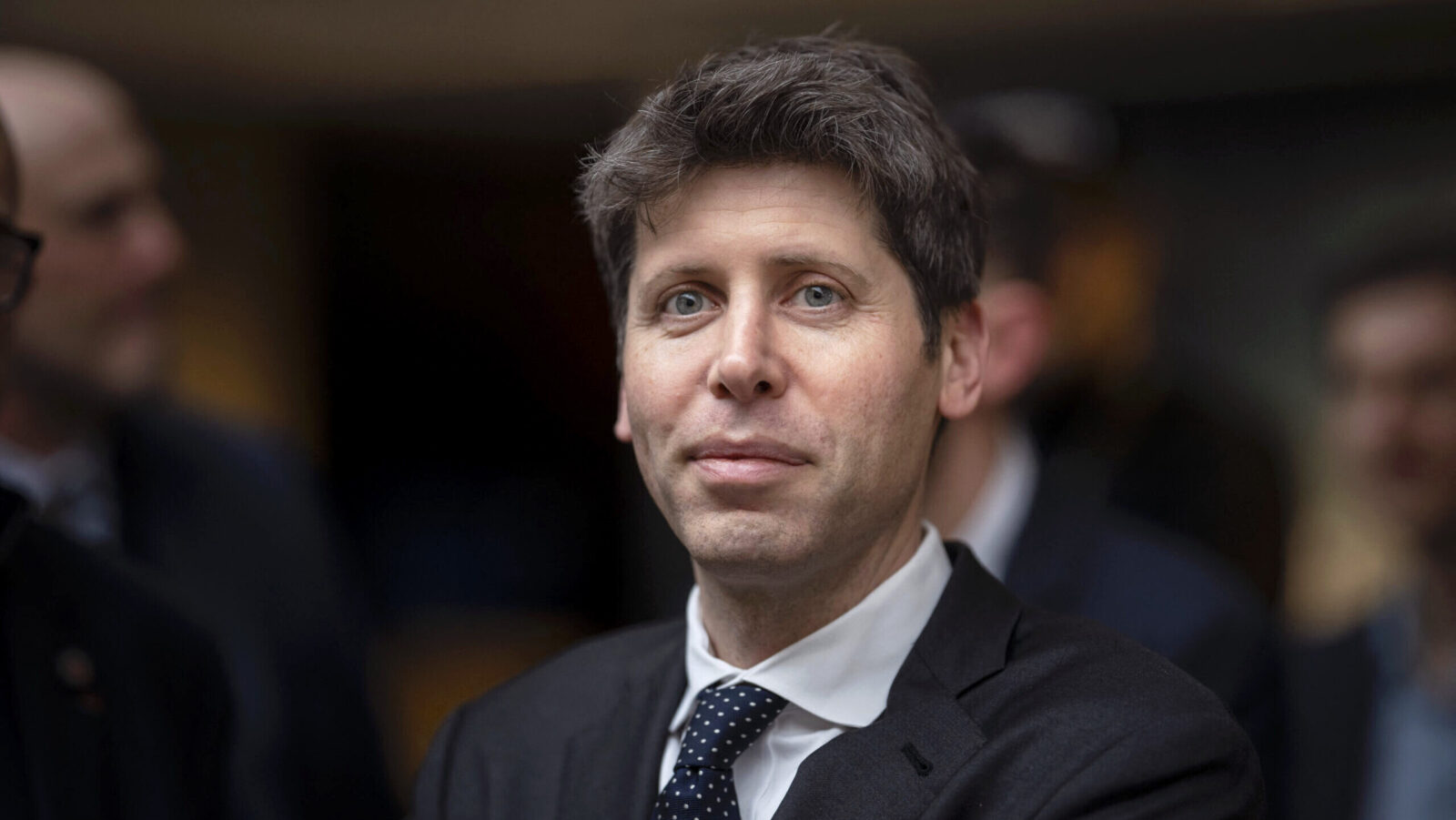Good morning.
Return-to-office enforcer-in-chief Jamie Dimon cut the ribbon on JPMorgan’s new $3 billion headquarters in Manhattan on Tuesday. Located at 270 Park Ave., the new digs were built on the site of the bank’s previous building and are a mere 10-minute walk from power dining spots like Monkey Bar and Grand Central Oyster Bar (or 15 minutes if one has a hankering for the $52 pounded yellowfin tuna with foie gras and toasted baguette at Eric Ripert’s Le Bernardin).
Dimon, who has pursued a post-pandemic return to the office with unsurpassed zeal, called the redevelopment “a physical labor of love” and “something that’s permanent, will be here for 50 or 100 years.” Meanwhile, The Banker reported on Monday that 2,000 JPMorgan staffers signed a petition demanding Dimon reverse his mandatory five-days-in-the-office policy. There may be no Monkey Bar, but for them, there’s still no place like home.
Wall Street Expats Mentor a Next-Gen Protégé: AI

For most people, training your replacement is a drag. If your replacement happens to be artificial intelligence, it may in fact be terrifying — unless you’re among the junior bankers who can’t hand off their soul-sucking chores fast enough.
On Tuesday, Bloomberg reported that OpenAI has recruited ex-staffers from Wall Street’s biggest banks to help train its AI to handle the arduous tasks performed by those workers. The initiative comes as the leading (and money-losing) AI firm seeks welcome and fruitful use cases for its expensive tech.
The 80-Hour Workweek
Life is notoriously tough for those on the bottom rung of the Wall Street ladder, where weeks can stretch up to 100 hours as higher-ups demand scores of crunched Excel numbers and last-minute (but often incredibly time-consuming) tweaks to PowerPoint slide decks. It’s why the tech industry has long seen the meticulous Wall Street work as ripe for AI disruption. And amid the recent spate of earnings calls, Wall Street’s biggest banks are already touting how deft AI deployment has helped keep headcount down even amid bumper profits. Still, others on Wall Street (including some burnt-out junior staffers) have warned that the grunt work of entry-level investment banking remains too important to career development to completely delegate to the robots.
Welcome or not, OpenAI is plowing forward. According to Bloomberg, the company is paying the Wall Street expats $150 per hour for their training services, presumably with the intention of selling the AI back to Wall Street for a small fortune. It’s a revenue stream the company may eventually depend on:
- By market cap, OpenAI’s $500 billion valuation makes it the largest private company in the world. But reports indicate the company has reached just $13 billion in annualized revenue this year, even as it committed to spending $1 trillion in the coming years to build out its AI infrastructure.
- Some 70% of company revenue comes from consumers purchasing its $20-per-month ChatGPT subscription (that maths out to about 5% of the chatbot’s 800 million worldwide users). Meanwhile, a US Census Bureau survey published in September showed that AI use at large companies is already starting to decline, while a recent MIT survey found that 95% of companies reported no new revenue from AI use.
In one recent tech pratfall, Deloitte refunded part of a client’s payment after submitting a report riddled with AI-generated errors, probably the sort for which junior bankers routinely get yelled at. Fortunately, bots are pretty thick-skinned.
Atlas Shrugged: Banking isn’t the only industry that OpenAI seeks to disrupt, however. On Tuesday, the company launched ChatGPT Atlas, a new AI-powered web browser built around the eponymous chatbot. The browser comes packed with an AI agent that can help users do everything from booking flights to online shopping — a.k.a., the types of tasks that Type B internet-users find about as draining as nine straight hours of financial modeling.
Explore The Shifting Urgency On Digital Payments

Despite new technologies and tools helping institutions move steadily toward an all-digital payment future, some businesses prefer tried and true payment options.
That’s just one of many surprising findings in Citizens 2025 Payment Trends Survey. This year, 300 treasury leaders shared where they are focusing their energy, including how speed and security are driving factors of digital payments adoption — and how AI and embedded finance APIs have made the transition easier.
Take a closer look at the top challenges facing middle market leaders, as well as how they are addressing them:
- 73% of businesses have adopted Real Time Payments (RTP) or FedNow, as speed has become a non-negotiable.
- Despite being 16 times more likely to be lost, stolen, altered or returned, paper checks are still used by over 50% of mid-sized businesses for perceived fraud prevention.
How does your payments strategy measure up to other CFO and treasury leaders?
US Army Recruits Private Equity for $150 Billion Infrastructure Overhaul
The US Army wants Wall Street to be all that it can be.
Army Secretary Daniel Driscoll told the Financial Times on Tuesday that he and Treasury Secretary Scott Bessent met with 15 of the top private equity buyout shops last week to pitch the likes of Apollo and Carlyle on funding a $150 billion infrastructure refresh.
Defensive Positions
If your first thought is, “Wait, doesn’t the Pentagon have a $900 billion annual budget and rising?” Driscoll has an explanation. The capital expenditure budget available to him over the next decade, he told the FT, is $15 billion, which is not enough to cover infrastructure modernization. (Government and independent reports in recent years have flagged outdated or obsolete IT and equipment as key issues.)
In a speech last week, Driscoll promised to adopt a “Silicon Valley approach” that would deploy new technology and weapons faster and expedite upgrades. “The traditional 12- to 18-month contracting cycle is just no longer feasible,” he said. “Tech advancement moves too fast for multiyear acquisitions.” The FT reported the private equity firms were asked at the meeting with Driscoll and Bessent to propose “clever” or “unique” financing models that could involve data centers, rare earth facilities, real estate refurbishments and the Army’s supply chain. Driscoll, who said he expects to have deals done by the end of the year, floated one unique idea himself: a “pay us in compute” model where, in exchange for access to Army land where they could build data facilities, firms would provide the service with computing power. If successful, it would be a unique spin on ongoing trends:
- Many militaries worldwide are increasing their budgets. In the wake of the Russian invasion of Ukraine, the EU boosted defense spending 19% last year to a record $402 billion. However, quicker and more nimble innovation has also come to the fore: One example is Ukraine’s rapid advances in drone technology.
- These investments have propelled defense industry stocks on both sides of the Atlantic. The STOXX Europe Targeted Defence ETF is up 101% this year, and the iShares US Aerospace & Defense ETF has climbed 45%.
Breaking Tradition: Driscoll promised last week to “disrupt the system” by moving procurement away from the largest defense contractors and toward tech upstarts. Palmer Luckey’s Anduril, which has already won defense contracts, was asked to submit mixed-reality displays it’s developing with Meta for testing.
Netflix Keeps Finding Ways to Steal Hollywood’s Spotlight
Is it a coincidence that you can’t stream the 1978 classic Boys from Brazil on Netflix right now?
The streaming giant slightly missed Wall Street’s earnings targets for its third quarter, which it chalked up on Tuesday to an unexpected expense over a tax dispute with Brazilian authorities. Otherwise, the results were pretty rosy: Revenue jumped 17% year-over-year, to $11.5 billion, and net income rose 8%, to $2.5 billion. Meanwhile, the Hollywood disruptor continues to find new ways to rattle Tinseltown.
Talking Heads
Shares of Netflix sank as much as 7% in after-hours trading on Tuesday, following the somewhat disappointing after-the-bell earnings call. That continues a downward trend that began after shares reached an all-time high on June 30. Since then, the company has found itself in Elon Musk’s culture war crosshairs, which weighed on the stock, and shareholders have raised concerns that the platform is failing to juice its user-engagement metrics.
Netflix seems to have the engagement question top of mind. Last week, the company announced a new partnership with Spotify (where co-CEO Ted Sarandos just so happens to be a board member) to air a slew of popular video podcasts on its streaming service. It was a direct shot at YouTube, Netflix’s biggest competitor in its war for TV time:
- According to Nielsen data, YouTube accounted for just over 12% of all TV time in the US in September, the most of any platform, while runner-up Netflix accounted for just over 8%. Meanwhile, in a year-end blog post, YouTube reported that viewers watched more than 400 million hours of video podcasts on their TVs per month in 2024.
- In other words, video podcasts have become the type of cheap, reliable talking-head content that used to eat up daytime linear TV schedules, which makes the medium a potential growth area for the engagement-hungry Netflix. The Spotify deal will bring the video feeds of popular Spotify Studios podcasts such as “The Bill Simmons Podcast,” “The Rewatchables,” and “The Ringer Fantasy Football Show” to Netflix, while removing their video feeds from YouTube.
It’s Easy As A-M-C: Netflix also scored a deal this month with longtime enemy AMC Theaters, which has agreed to play Netflix’s ultra-popular animated film KPop: Demon Hunters when it’s re-released for a limited theatrical run at the end of the month. The children’s musical became a smash hit when it debuted on Netflix on June 20 and went on to surprise box office success when Netflix gave it a limited theatrical release in August (AMC declined to screen the film at that time). If Netflix is increasingly interested in the power of the box office, it may have a big opportunity on its hands.
On Tuesday, Warner Bros. Discovery, which recently rebuffed an offer from David Ellison’s new-look Paramount, announced it is officially open to a sale and that there are multiple interested parties. Is one of them Netflix? During an interview at the Bloomberg Screentime Conference earlier this month, co-CEO Greg Peters implied the company wasn’t interested, citing Netflix’s history as “builders rather than buyers” and noting big media mergers “don’t have an amazing track record.” Still, sources told CNBC that Netflix would be remiss to let a competitor snap up WBD at a low price.
Extra Upside
- All That Jitters: Gold came tumbling down Tuesday, with the metal’s futures suffering their worst day in over a decade after a blockbuster year; the selloff hit silver, too.
- Lighter Up Top: Seven board members of embattled Ozempic-maker Novo Nordisk are set to quit amid a fight over structural changes with the non-profit foundation that is the company’s majority shareholder.
- Your Portfolio’s Premium Experience. Webull Premium gives you up to 3.85% APY on uninvested cash, reduced margin rates, and a 3.0% IRA Transfer Match. Experience Webull from your app or desktop. Experience Webull Premium.*
* Partner
Just For Fun
Disclaimer
*Webull Financial LLC, Member SIPC, FINRA. Investing involves risk. Subscription required. Fees may apply. More info at webull.com/disclosures
APY (Annual Percentage Yield) reflects the total amount of interest earned over a year. Rates are variable and may change at any time without notice.

